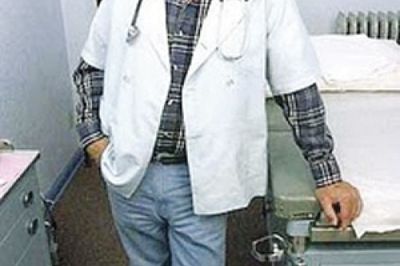When I first heard someone mention the documentary Trinidad, I thought that they were discussing a travel piece about the Caribbean. It wasn’t until later that I would discover what the 2008 film was really about — how the lives of thousands of people were changed by one man and how a small southern Colorado town developed an international reputation.
Located about 650 miles west of Kansas City, the town of Trinidad, Colo., lies below Simpson’s Rest, a sandstone bluff that is a geological mecca of sorts and a once-popular stop along the Santa Fe Trail. It was from this point that settlers would make the final push to the trail’s namesake city in New Mexico, around 150 miles away.
In 1954, Dr. Stanley Biber came to town. A former rabbinical student who had opted to study medicine over the Torah, Biber was finishing out his enlistment in the Army at Fort Carson, Colo., when he was offered a position in the coal-mining town of Trinidad at the United Mine Workers’ health clinic.
Biber accepted this new post that was, no doubt, radically different from his preceding job as chief surgeon of the MASH unit in the Korean War.
Biber was a young, brazen doctor, and no job he did would be ordinary. Known among his peers for once performing 37 surgeries before collapsing from exhaustion, Biber was tough and determined. By hiring Biber, the United Mine Workers unwittingly helped to create social change and advance the United States’ position in the sexual-reassignment surgery international market.
In the beginning, Biber’s work at Mount San Rafael Hospital was pretty routine, as he cycled through the demands of an on-call doctor and surgeon. But in 1969, when only a few coal mines remained, the city’s reputation and even its economy started to change after one friend helped another.
That year, a social worker colleague of Biber’s asked him for a favor. The colleague revealed to Biber that she was in fact still biologically a man and had been living as a woman. She said that she admired Biber and asked whether he would perform sexual-reassignment surgery to help her make the final advance toward being a woman.
Biber, not even knowing what such a request meant, recalled his bold ventures of the past and acquired the sketches that a surgical team had created about the procedure from Johns Hopkins University. Few doctors in the world had performed such a procedure, but Biber refused to be deterred. He performed the surgery, describing it as “looking like hell,” and opened a proverbial can of worms.
Word of mouth spread of Biber’s new capabilities, and those in need of assistance traveled to Trinidad, a town of about 10,000 residents, to seek help. Most were male-to-female transitions, but female-to-male transitions were also performed. Biber’s patients had myriad backgrounds, ethnicities and profiles, and over the years he performed about 5,000 sex-reassignment procedures. His patients brought family members and friends along to Trinidad who boosted the economy during their stays. His work also earned Trinidad the unofficial title of “Sex Change Capital of the World” and opened the door for the legacy to continue.
When Biber was 80 years old, he passed his practice to Dr. Marci Bowers, a transgender person herself. Stanley Biber died at age 82 on Jan. 16, 2006 — which, coincidentally, was the same night that Felicity Huffman won the Golden Globe for her portrayal of a transgender woman in the film Transamerica.
In Trinidad, this work continues today with a bit more dramatic description than Biber might have offered over the years. But the importance of the work has never been minimal. Biber’s openness to serve the needs of his patients parallels the same debate that has been put forth time and time again with the “right to die” issue publicly led by the infamous Dr. Jack Kevorkian. Medical professionals like Biber can alter the state of affairs when it comes to equality by simply being open to a fellow person’s plight. This seemingly simple gesture holds the keys to unlocking understanding and progression forward.
No one can know what might have happened that afternoon in 1969 if Biber had refused to perform the procedure. One thing that we do know is that 5,000 people might not be living their lives free from the shackles of gender dysphoria.
A renaissance man in his own right, Biber altered the lives of many both literally and figuratively, and he ignited a small town by demonstrating the ethic of the Old West through his courage and independent spirit.
DVDs of the documentary Trinidad are available for purchase at
trinidadthemovie.com.
